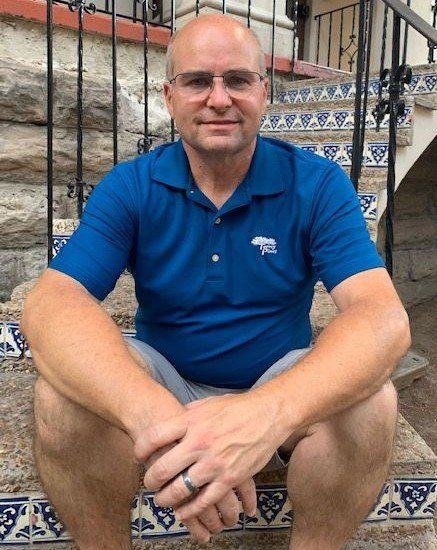Learn more about my book "The Courageous Ask"
The Christian Leadership Pedestal
Executives
-pastors or nonprofit executives in our context- are put on a pedestal. It’s not that the typical person necessarily believes they belong there or desires to put them there. But it is human nature that this happens.
The general public often places much higher expectations on leaders than they do on themselves. Sometimes it is appropriate, and the leader has put themselves in that position.
In some cases, it is simply scriptural. For instance, James 3 points out that those who teach will be judged more strictly, thereby heightening the expectations of those who lead and teach.
But what about
when we accept, and enact, those elevated expectations and forget the humanity of our leaders? Often a community heaps on a leader the expectation that they are to perform with the perfection of Jesus and not simply be a Jesus follower and disciple just like them, but with a unique calling and heightened responsibility.
Too many times when a leader shows human imperfection, the respect we have for them is damaged. Leaders fall under strict judgment, and we forget they are no less fallible than us. The imperfection they have colors any positive experience we would have had with them otherwise.
While most of us acknowledge this strict, hypocritical judgment and recognize it as not being how we want to treat our leaders, it is a difficult battle to fight in our own attitudes and minds.
No matter who the leader is, they are not Jesus. But please allow me to reverently make some comparisons.
(This blog focuses on starting a conversation centered on preventing the fall of nonprofit leaders. I write it from a Christian perspective, but all leaders will benefit. Be sure to sign up to receive these articles via email every Tuesday at
briankreeger.com as well as taking a look at previous blog articles. In addition to receiving these articles two days before they hit social media, you will receive the article "5 Early Indicators of a Christian Nonprofit Leadership Fall" along with the Contents, Introduction and the Appendix (My story) of my book,
The Courageous Ask: A Proactive Approach to Prevent the Fall of Christian Nonprofit Leaders.)
I am reminded of the words of Todd Agnew in his song
My Jesus. “Pretty blue eyes and curly brown hair and a clear complexion is how you see Him as He dies for your sins.”
Isn’t this the Jesus we choose to see in our everyday life?
I mean, don’t we see the Jesus reaching out His hand to us, the Jesus holding a lamb, the Jesus guiding the hand of the surgeon as he performs surgery on a loved one, the Jesus holding a child, the Jesus teaching a crowd, or the picture of Jesus in all his perfectly manicured glory hanging on the cross with the bright light behind Him highlighting His silhouette? That’s who we typically see, right?
The second part of the lyric from Agnew’s song provides a contrast to the beginning: “But the word says He was battered and scarred or did we miss that part?” I think most people do. Absolutely brilliant lyrics.
What we have here in this song is an entirely accurate depiction of Jesus in our mind’s eye, no matter which view we choose to see Jesus from at a particular moment of time in our lives.
How do we see our leaders? Battered and scarred, accepting the unjust punishment of this world? Damaged? Perfect, with pretty blue eyes and curly brown hair? Or how about an embodiment of the perfect pictures as described in the previous paragraphs?
We may have an incredible amount of respect for our executive leaders. In fact, maybe it’s admiration because they have so inspired us. This is especially true if they are founders who have seemingly created something from nothing with God’s guidance. We may be amazed at what God has done through them to courageously move forward in accomplishing what people thought was impossible. We hold them in high esteem and put them on a pedestal.
Somewhere inside us, we recognize they are human and are not perfect, but our focus remains on the great things they have done. We forget their humanness since they have been able to put on airs that everything is under control for the benefit of the advancement of the organization.
Somehow Jesus supernaturally handled all that was thrown at Him and responded in a way that only He could; He was God incarnate. He responded with incredible grace and mercy to those who were the true offenders.
I suspect that many times we expect our leaders to be Jesus Himself instead of a fallible human being—a follower and disciple just like us. But they are not Jesus.
I hope that makes you think a bit.
While I know I am using Jesus to compare and contrast the picture of our nonprofit executives, the same principles apply in a non-Christian organization.
Part of the proactive approach to preventing the fall of a nonprofit leader is recognizing they are no different than us and properly applying that recognition.
So, how can we put into practice the recognition of the leader’s fallibility?
In his song, Todd Agnew says that he thinks that “Jesus would prefer Beale Street to the stained-glass crowd.” I agree.
Setting aside the fact that I enjoy Beale Street in Memphis (love that barbecue!), I believe what Todd is saying is that Jesus preferred to be in the real world where people are living real life, experiencing real joy, in between the very real battles of the hurt, pain, and other difficulties that infect their lives.
Hurt, pain, and difficulty
are ever present in the life of a nonprofit executive leader. In his book
Leadership Pain, Samuel Chand says that leadership is actually a magnet for pain and comes in many forms. Leadership pain is part of the real-world Jesus would prefer to be present in.
While many people in the Christian community strive to represent Jesus in the real world, they forget that they can represent Jesus in the life of an executive nonprofit leader who is dealing with very real leadership pain.
Does the real world exist in your church or nonprofit? More specifically, is the real world allowed to exist in your church or nonprofit?
Another line in Agnew’s song says, “My Jesus would never be accepted in my church. The blood and dirt on His feet might stain the carpet.” This is a picture of society coming into our Christian communities and our acceptance of it. Don’t we want broken society coming into our churches?
Sometimes that society comes in the form of our leader who is struggling in a church or nonprofit.
I certainly recognize what James 4:4 states: “Don’t you know that friendship with the world means enmity against God?” But there must be room for the grace and mercy that the Gospel provides.
I’m not talking about friendship with the world; I am talking about proper application of grace and mercy to the world that needs the message we have to offer. That is sometimes hard, as we battle our own human pride.
I have seen tremendous grace and mercy toward the sinner provided in a wide variety of Christian contexts. But I have also seen and experienced the opposite, when a leader sinfully brings the real world into the Christian community. A real world that everyone, including Christians, exists in and that God addresses all throughout scripture.
Are the people that brought the real world in still genuinely loved and accepted without harsh judgment and arrogance, as if we don’t fight some of the same battles, only secretly?
Yes, I understand the need for appropriate action to take place in the unrepentant heart of a sinner in a church or nonprofit context. That is certainly described in my book and in these blog articles. The board has a responsibility to deal with this type of thing.
Here is a good question: is your leader, whether a pastor or the executive of a Christian nonprofit, allowed to be part of the fallible real world, and are they still loved and accepted if they knowingly or unknowingly allow the real world into their own life?
The inability for a Christian nonprofit leader to not only be themselves, but to live with the fear of transparency with their accountability structures or those they come in contact with can be the source of a fall.
This fear can definitely cause the loneliness and isolation that can lead to a fall.
And what are they afraid of? They are afraid that people will see that they are no different than them. That’s a very real fear, but a fear that should not exist.
I hope you choose to be where Jesus chooses to be, walking alongside real people (including our leaders) in the real world.
In my next blog article I will delve further into what a community can specifically do to help Christian leaders remain upright.
Until then, choose a leader you would love to invest in. They need it.
Be Courageous!
Be Proactive!
Be sure to sign up to receive these articles via email every Tuesday at
briankreeger.com. In addition to receiving these articles two days before they hit social media, you will receive the article "5 Early Indicators of a Christian Nonprofit Leadership Fall" along with the Contents, Introduction and the Appendix (My Story) of my book,
The Courageous Ask: A Proactive Approach to Prevent the Fall of Christian Nonprofit Leaders.
#LeadershipFall #LeadershipSurvival #NonprofitRelationships #ProactiveApproach #LeadershipStruggles #LeadershipBattles #ChristianExecutiveLeader #ChristianLeader #CourageousAsk #Proactive #ProactiveLeadership #NonprofitLeadership #ExecutiveLeadership #ChristianLeadershipFall #LeadershipPedestal






